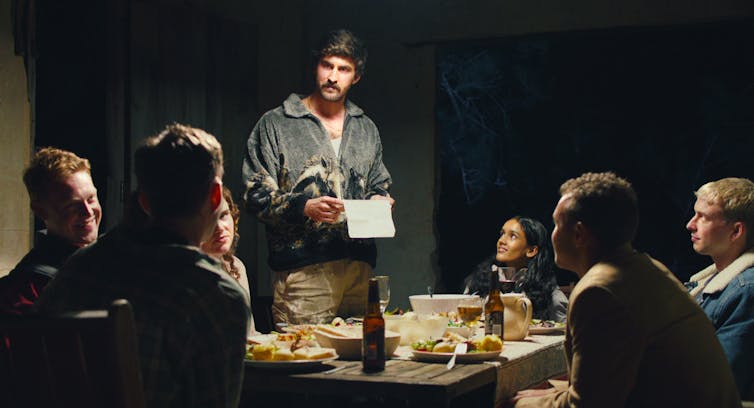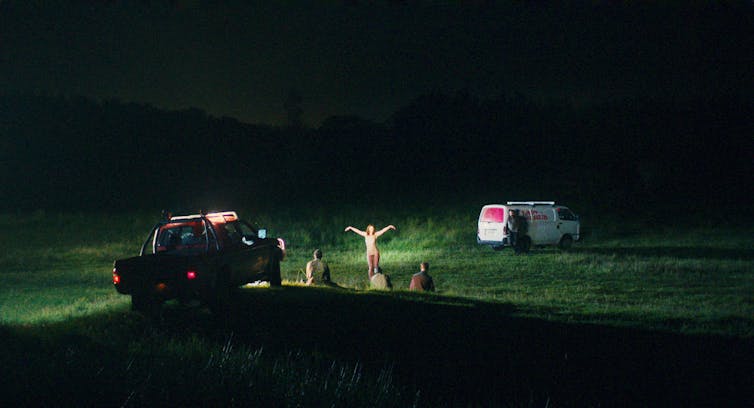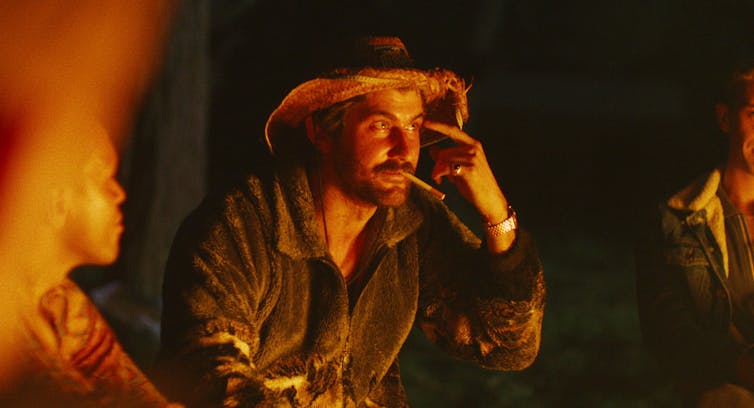In an early scene in Jack Clark and Jim Weir’s Birdeater, we catch a glimpse of a poster of Ted Kotcheff’s Wake in Fright (1971).
More than in any other film of the period, Kotcheff managed to capture something of the unhinged, deranged quality of homosociality in the Australian outback in a hallucinatory, nightmarish, nihilistically comedic romp.
Read: Best Australian horror films – top 20
As the epigraph of Kenneth Cook’s eponymous novel suggests: ‘May you dream of the devil and wake in fright.’
The Australian cinematic landscape seems primed for a return to this theme. Horror cinema is more popular now than it’s been for years, and more critically acclaimed than it’s ever been.
From the opening image, Birdeater feels like it’s going to be another entry in this New Wave, filtered through an anarchic Australian sensibility.
Irene (Shabana Azeez), an anxious English woman in a relationship with quintessential Aussie ‘nice guy’ Louie (Mackenzie Fearnley), is coming along for Louie’s buck’s party.
In a rural location, only accessible via ferry, we sense a return to the perennial theme of Australian horror: the sinister experience for the foreigner or city dweller when going into the Australian bush and outback.
Think about backpacker Liz Hunter’s experiences in Wolf Creek (2005) as she comes under the eye of killer Mick Hunter, or Canadian Carl Winters from Razorback (1984) who comes to Australia in search of his missing wife and ends up fighting both local hoons and a killer pig. Or, indeed, the experience of urbanite schoolteacher John Grant (Gary Bond) in Kotcheff’s film as he is thrust into a bloody, two-up-and-alcohol-infused nightmare in the ‘Yabba.
There are, at the same time, echoes of Ari Aster’s critically acclaimed Midsommar (2019) here. Irene and Louie’s relationship isn’t exactly perfect – he keeps giving her glasses of water and she keeps taking pills – but the actual source of the menace is tantalisingly unclear.
They have some kind of toxic codependent relationship involving an accident he had, anchored around her desire to secure a visa so she can stay in Australia.
A stellar opening – and then it fizzles
When the friends reunite for the buck’s party, we immediately recognise their personality clashes, and sense things are going to get nasty quickly.
The core trio of old friends involves bungling, hen-pecked Christian virgin Charlie (Jack Bannister), loose cannon Dylan (Ben Hunter) and good guy control freak Louie.
Or, as Dylan notes in one of the great bad toast scenes in cinema – he’s trying to get his own back against Louie for refusing to take ketamine, refusing Dylan’s offer of a beer, and accusing Dylan of being a child – the smart one, the funny one and the nice one.

This is a ‘modern’ buck’s, so women are included too. There’s Grace (Clementine Anderson), partner of Charlie, and, of course, Irene herself. When Irene’s ex (or is he?) Sam (Harley Wilson) turns up for the party, we sense the powder keg is full and, if Wake in Fright is anything to go by, things will get explosively and violently weird pretty quickly.
Alas, it never happens. After a stellar opening 40 minutes, it fizzles out.
All of the intrigue, all of the tension and all of the mystery of the opening seems to be little more than a ruse, a trick to keep us engaged with the film. It works at first, but for no real thematic purpose, with the result that, at the end of its two hours, Birdeater seems like little more than a really well-made music video or ad.
It’s all set-up, with little pay-off. The spare, elegant cinematography, the hypnotic score and sound design, the weird associative logic of the opening taper off into a dreary two hours. It becomes increasingly wordy and navel-gazing. Its cloak of mystery and intrigue comes off and instead of the rip-roaring, unsettling horror romp we were expecting we’re left with a Home and Away-level story.

The mystery is resolved along conventional psycho-dramatic lines. Even its attempts at delving into current buzzy concepts like gaslighting, coercive control and toxic codependency seem superficial, lacking psychological depth or any real acuity.
Let me be clear: Birdeater is brilliantly shot and edited, the sound design and music are exemplary (the best in Aussie cinema since 2011’s Snowtown) and the acting is absolutely first-rate (newcomer to the big screen Ben Hunter as Dylan is a standout, but Mackenzie Fearnley as Louie, a kind of cross between Joseph Gordon-Levitt and Ben Mendelsohn, is also exceptional).
Kudos for this to all involved in the film – it just works from the opening shot, following its own compulsive logic. The characterisations have the right level of caricature and nuance to be effective, and it perfectly sets up the kind of blokey Aussie nightmare scenario in which it’s an affront to not skull a beer. It’s also the first Australian film since Upgrade (2018) that actually feels like it should be seen in a movie theatre.

But it’s thematically threadbare and derivative and, ultimately, disappointing. Unlike Wake in Fright, once the haze clears, we’re left with little of substance, in a film with less conceptual depth than it seems to think it has.
Birdeater is worth seeing. It is undeniably better made than most new films, even if it plays far worse than many more old ones.
Birdeater is in cinemas now.
Ari Mattes, Lecturer in Communications and Media, University of Notre Dame Australia
This article is republished from The Conversation under a Creative Commons license. Read the original article.
